Packed Like Sardines
Another rain system has moved into our region, and we are currently tent-bound at base camp. We are hoping that the clouds will lift and the rain will clear so that we can continue on with fieldwork. With four scheduled days remaining in the expedition, getting a couple more days of nicer weather is going to be crucial for accomplishing our goals for data collection. For now, we are packed like a can of sardines in the cook tent with boots and rain gear drying near the heater while we do what we can on our computers/field books to maintain some level of productivity.
Bullet Boulders, Striations, and the Investigation of Mulajokull's Ice Flow: An Undergraduate Research Project by James Amato
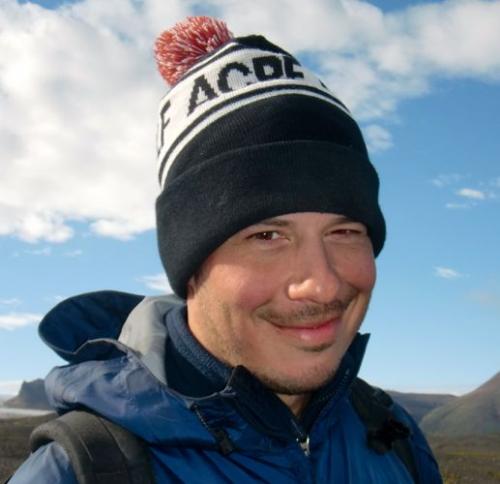
James is here on the expedition to not only help Dr. Iverson and Dr. Hooyer with AMS and Pre-Consolidation sampling of drumlin till. He is also here to complete a separate research project as a requirement of his Undergraduate degree in geology for UW-Milwaukee. Many Undergraduate programs in the natural sciences require students to complete a formal research project and present the results to a group of peers. This provides Undergraduate students with wonderful practice being a professional scientist and presenting research results at large international conferences (American Geophysical Union, Geological Society of America, etc.)
The NSF grant that provided funding for Neal and Tom's project here at Mulajokull included funding for James' flight and food to help as an Undergraduate research assistant for AMS and Pre-Consolidation sampling. Simultaneously, James was granted funding from the UW-Milwaukee Undergraduate Research Grant to provide a $4,000 stipend for his fieldwork and laboratory efforts, under the condition that he complete a separate research project while here and present his findings at the annual UW-Milwaukee Undergraduate Research Symposium during spring semester 2014.
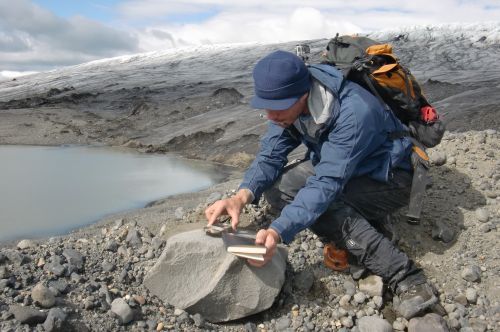
To decide how to approach this project, James spent a couple of afternoons walking around with Dr. Hooyer (his advisor) and brainstorming what other types of field measurements could aid in determining the formation of drumlins. In scientific investigations, it is useful to support quantitative measurements like AMS and Pre-Consolidation with supplemental or secondarys measurements of a different quantity. Similar to how a crime is ideally solved by many different pieces of evidence, scientific claims are ideally supported by many different kinds of quantitative measurements.
James has chosen to complete his Undergraduate research project by providing Dr. Iverson and Dr. Hooyer with a valuable set of supplemental data regarding Mulajokull's ice flow direction during the formation of all of these drumlins. To do this, James is studying the directional orientation of striations that have been carved into large boulders that lay on the surface of drumlins.
Striations are linear gouges in the boulders that generally run parallel to ice flow direction. You see, glaciers pluck and remove rock fragments from the surfaces that they move over. These rock fragments become frozen within the ice, and grind over other rocks during advances of the glacier, leaving striations behind. Bullet boulder striations are a result of this process, and since they are still located within the till of the drumlins in their original location, provide a useful indirect measurement of the direction that Mulajokull's ice flowed during its most recent advance. See my journal from 6/14/13 "Glaciers in a Nutshell" for some more images and detailed descriptions of this process.
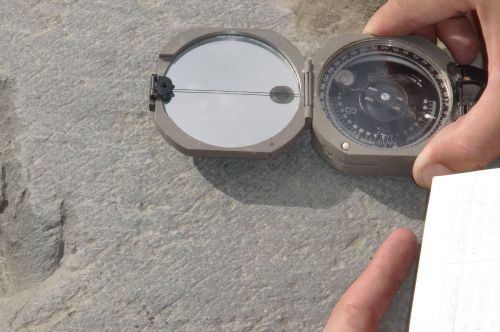
Knowing the direction these striations are oriented will allow for safe judgments to be made for how ice may have onceflowed over the drumlins, and will provide the team a valuable set of supplement of data to support the AMS fabrics. Think about it this way: AMS fabrics will shed light on the microscopic evidence for how the till in the drumlins may have been put into place, and James' measurements of bullet boulder striations will provide macroscopic evidence for how the till in the drumlins may have been put into place.
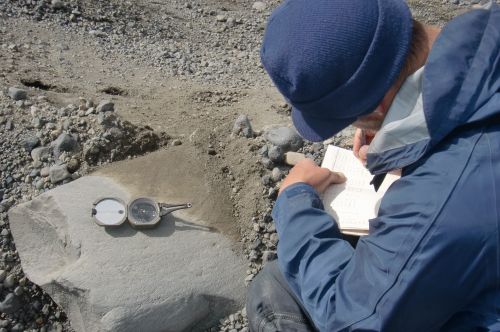
Here is James' choice of methodology for completion of his data collection. He will spend the upcoming school year processing these data and generating a poster to present his final results at the 2014 UW-Milwaukee Undergraduate Research Symposium:
- Choose three consecutive drumlins for sampling.
- Locate 15 large bullet boulders all across the surface on each of the 3 drumlins (top, sides, front, back) for a total of 45 bullet boulders.
- At each bullet boulder measure the length/width/height, GPSA Global Positioning System (GPS) is a satellite-based navigation system used to track the location or position of objects on the Earth’s surface. coordinates, and choose three striations to measure the direction they are pointing (off of North) using a Brunton compass.
- Take a picture of each boulder.
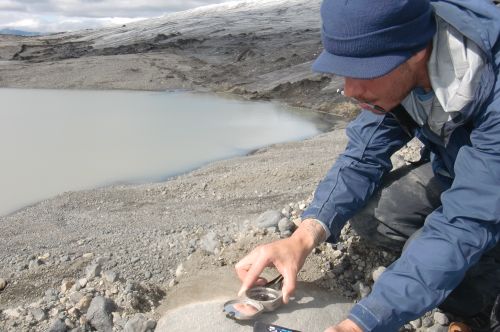
Women in Science
Our complete expedition team is composed of ten men and three women; each of us with a career in the field of science. From researchers, to educators, to students, we reflect nearly every essential element of the scientific community. Over the last century, the scientific community has increasingly become an open and level playing field for both men and women to pursue their scientific career and research interests.
None of this has come about, however, without exceptional work, effort, and sacrifices being made by both genders. The following Q & A with the three females on our team will hopefully shed a bit of light on how gender balance in science has evolved and views of gender in science have changed over the last 30 years.
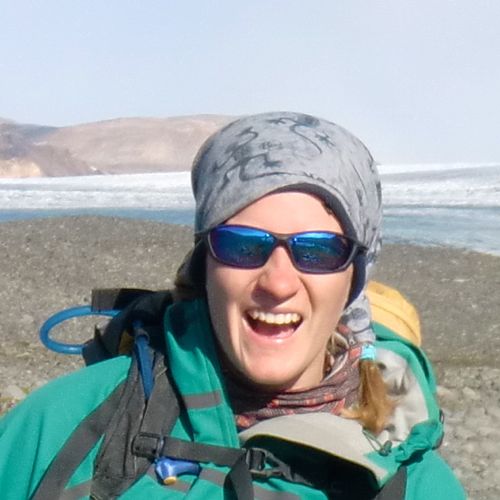
We start with Libby Woodford, one of the Master's students here at Mulajokull. A recent college graduate at age 21, Libby is the youngest female scientist on the team.
Educational Background: B.S. Earth Science, Northern Michigan University, Department of Earth, Environmental and Geographical Sciences
Current University: M.S. GeologyThe science that deals with the dynamics and physical history of the earth, the rocks of which it is composed, and the physical, chemical, and biological changes that the earth has undergone or is undergoing., University of Wisconsin – Milwaukee, Department of GeoscienceStudy of the Earth.
Hometown: Waukesha, Wisconsin
At what point in your life did you begin to enjoy learning science, and realize you wanted to become a scientist and pursue a career in science?
The first memory I have of enjoying science was an experiment we did in my second grade. We put a flower seed in a plastic bag with a spritz of water and hung them in the classroom window. Once we did this, we had to write down a hypothesis: Would the seed sprout without soil. Now, I knew that plants needed water, sun and soil to grow, so of course the plant would not sprout without soil. My mind was absolutely blown when in three days the seed sprouted with nothing but water and sunshine. It was so cool. Other than that, I've always loved looking through and reading National Geographic Magazine, watching the Discovery channel, and comparing what I learned from those resources and in school to what I saw around me. I knew since high school that I wanted to pursue a career in science and to be a scientist. What always varied was what sort of science I wanted to study. The physical geography and geology classes I took in college really struck a chord with me, and I haven't really looked back since.
Why did you choose a career in science over other career options?
I love learning and discovering new things. While this is something that can be done and should be encouraged in any profession, it was the most apparent and exciting to me in the sciences. I specifically chose to pursue a career in the geosciences for many reasons. Most prominently, I like being outside and wanted to be in a profession where I could explore and work to understand the natural world. I also like stories and the history of things. The geosciences take the history of our planet, the processes shaping that history, the evidence for how our planet has changed throughout that history, and allow you to understand our planet in the present. The other thing that drew me to this topic was how pure science and field observation come together. The travel opportunities aren't so bad either!
What is needed most in the scientific community to support women with careers in science?
Honestly, I haven't encountered any barriers in my education or desire to pursue science as a career. I do not feel my gender has hindered my progress in any sense. Obviously, there are many women who have endured and overcome prejudice whom have made my experience possible.
What is needed most in our society to support women with careers
I think we need more visible role models for young women. From what I've seen, the only barrier to women getting involved in the sciences is mental. A large percent of those who become successful in scientific careers are not female. In my middle school and high school, only one of the seven science teachers I had was female and at Northern Michigan, the story was and is very much the same. However, the number of girls in my high school AP and college math and science classes matched or outnumbered the number of boys. I recently attended a career luncheon for geoscience students, and all of the eight guests were men, while there were equal numbers male and female students in attendance. I had many "women-in-science" role models, because my choice of entertainment as a teenager involved watching the Discovery and National Geographic Channel, and my favorite television genre was and is science fiction. In most popular television there are plenty of strong female characters, but not a lot of scientists. And when they are scientists, they have some other quality that makes them quirky or undesirable. Part of me believes this will come with time. I don't know the statistics, but I think the lack of barriers for my generation means there will soon be more women in science professions.
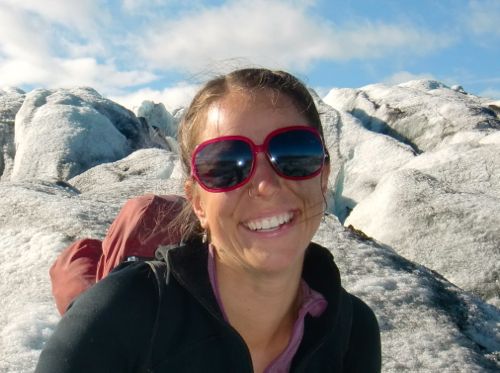
Next is one of the PhD students on the team. Also a recent college graduate, Reba is 24 years old.
Educational Background: B.A. from Vanderbilt University, 2012
Current University: Iowa Sate University
Hometown: Knoxville, TN
At what point in your life did you begin to enjoy learning science, and realize you wanted to become a scientist and pursue a career in science?
As the daughter of two biologists, science has been a part of my life since before my memories begin. My dad and I used to play "How many animal Phyla do you see?" when we visited tidal flats on beach vacations. I was probably the only ten-year-old who knew the difference between Echonidermata and Arthropoda. The first memory I have of being independently interested in science is from third grade. I was in the Talented-and-Gifted program at my school, which was a sort of special course for which kids could qualify through their standardized test scores, and every week, we focused on a new topic. Talking about cloud types was really exciting, but when we started discussing the eukaryotic cell and its components, I was fully engaged. I remember watching a cheesy computer animated "tour of the cell" and making Jello-and-fruit models of living cells. That was my first glimpse into something that seemed like another world (and boy did I love the idea of other worlds). I wasn't hooked on science at that point, and I don't think I actually realized that I wanted to be a scientist until I was in eighth grade or so. But that is my first memory of getting totally into it.
Why did you choose a career in science over other career options?
I have always been attracted to the sciences, and I daydreamed of a future in several scientific disciplines before I found glaciology/glacial geology. During my first three years of college, I took advanced courses in biology, chemistry, geology, math, and engineering, at a complete loss as to which appealed to me the most. The farthest I strayed from science was a brief stint in economics (environmental economics, specifically), but my first and only science-free semester in college was incredibly unsatisfying, and I quickly realized that I would not be happy without a little science in my life. The next semester, I took exclusively science courses, changed my major to geology, and never looked back. Basically, I have a scientific soul.
What is needed most in the scientific community to support women with careers in science?
I have to emphasize that I am answering this question from the perspective of a female geologist of my generation. My mother, who got her degrees in biology in the seventies and early eighties, has had a really different experience. In fact, I have heard stories from many women of her generation indicating that times used to be more difficult for the female scientist. Thus far, however, I have felt fully supported by the scientific community; if anything, I think the bias is in my favor as a woman, as the National Science Foundation has a diversity category that favors women and minority scientists applying for grants. I would prefer that the playing field be leveled and that my peers view my work for its scientific merit and ignore the fact that I am a woman.
What is needed most in our society to support women with careers
I have not experienced many societal blocks for women seeking careers in science. It seems to me that most of the blocks that women might experience are ones that they erect themselves. So society could encourage women--and anyone, really--to pursue careers in science by giving them opportunities for scientific exploration early on in their lives.
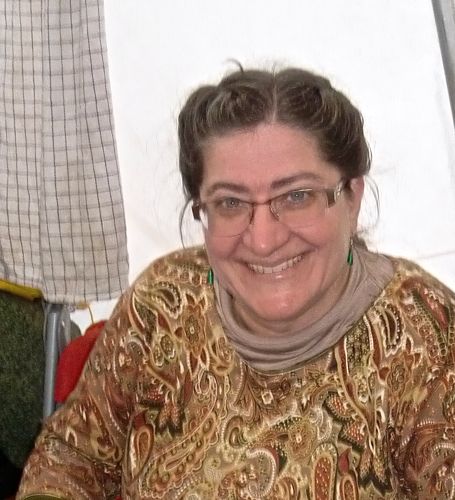
Sandi is 55 years old, and has worked in the scientific community over the last 30 years.
Educational Background: BS Chemistry 1981 University of Wyoming, MS Agronomy 1985 Montana State University, BFA Sculpture 2014 (anticipated) Drake University
Current University: Laboratory Instructor, Drake University
Hometown: Des Moines, Iowa
At what point in your life did you begin to enjoy learning science, and realize you wanted to become a scientist and pursue a career in science?
Chemistry was my strongest subject in high school; I was fortunate to have two years of chemistry instruction. I decided to major in chemistry at University to qualify for a good job with just a Bachelor's degree so that I could then pay my way through law school. Once I was at university and worked my way through the chemistry curriculum, I decided against law and decided to pursue agriculture.
Why did you choose a career in science over other career options?
I became interested in the subject of sustainable agriculture toward the end of my Bachelor's degree. I wanted to help advance ideas from sustainable agriculture amongst farmers.
After spending time out of the workforce to build our family, I discovered my ability for teaching science. I began teaching chemistry, physics, soils and botany in 1996 at a community college in New Zealand. I've since been teaching chemistry laboratories at Drake University since 2001.
What is needed most in the scientific community to support women with careers in science?
In order to support women with careers in science, the scientific community would be uniquely positioned to support all people, whether or not they intend to have children, in finding a healthy balance between work-life and home-life.
It is ridiculous that people who are early in their careers work 60 or 70-hour weeks in order to achieve tenure or promotion. In order to support women, and indeed all scientists, this imbalance must be addressed.
Further, the scientific community would be uniquely positioned to pioneer the opportunity to be able to work part-time without losing work-years or benefits. This would support scientists who want to be their children's first teachers, helping to foster the development of gifted and talented children, which I observe are often born to families of scientists.
What is needed most in our society to support women with careers
Women in general have, in the past half-century or so, achieved the liberating experience of transcending traditional roles and are benefiting from opportunities as scientists.
I recently completed a course in Contemporary Ethical Issues in which I became aware of the tendency for men in general, and young men in particular, to police each others' behaviors in terms of masculinity. I feel strongly that in order for society to support women with careers in science, the self-policing of ideas by men of 'what is masculine' needs to be addressed so that men can transcend traditional roles as women have already done.
It's Time to Get Back Out There
The rain has slowed a bit, although we are still experiencing pockets of heavy precipitation every so often. The rest of the team has packed up and headed out to the drumlin field to continue the last bit of our sampling. It's time for me to put on my rain gear and hike out there to meet them and support the efforts.
I hope this journal has sparked some thoughts within you. Whether you hold a career in science, or are considering career in science, I hope that the review of James' work as an Undergraduate student, and the Q&A with our female scientists at Mulajokull have given you some food for thought as to what it is like to hold, live, and pursue a career in the scientific community.
Cheers,
Jamie


Comments